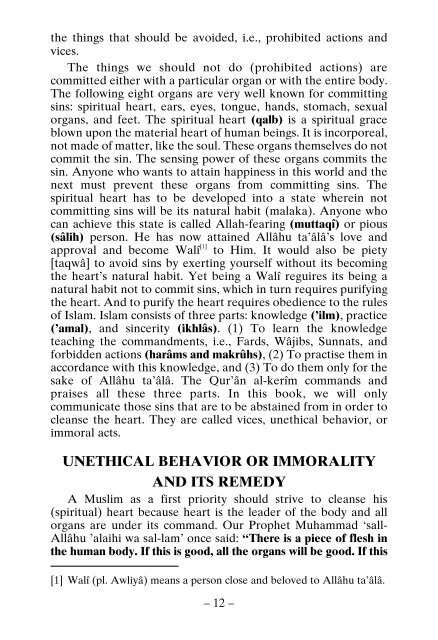Ethics of Islam
Ethics of Islam is taken from the book Berîka by Muhammad Hâdimi. Immorality and ways to get rid of it; 40 depravities and cures to them; usefulness of ethics; what is a soul; strengths of a soul; Personalities emanating from wisdom, courage, chastity and justice are extensively explained.
Ethics of Islam is taken from the book Berîka by Muhammad Hâdimi. Immorality and ways to get rid of it; 40 depravities and cures to them; usefulness of ethics; what is a soul; strengths of a soul; Personalities emanating from wisdom, courage, chastity and justice are extensively explained.
You also want an ePaper? Increase the reach of your titles
YUMPU automatically turns print PDFs into web optimized ePapers that Google loves.
the things that should be avoided, i.e., prohibited actions and<br />
vices.<br />
The things we should not do (prohibited actions) are<br />
committed either with a particular organ or with the entire body.<br />
The following eight organs are very well known for committing<br />
sins: spiritual heart, ears, eyes, tongue, hands, stomach, sexual<br />
organs, and feet. The spiritual heart (qalb) is a spiritual grace<br />
blown upon the material heart <strong>of</strong> human beings. It is incorporeal,<br />
not made <strong>of</strong> matter, like the soul. These organs themselves do not<br />
commit the sin. The sensing power <strong>of</strong> these organs commits the<br />
sin. Anyone who wants to attain happiness in this world and the<br />
next must prevent these organs from committing sins. The<br />
spiritual heart has to be developed into a state wherein not<br />
committing sins will be its natural habit (malaka). Anyone who<br />
can achieve this state is called Allah-fearing (muttaqî) or pious<br />
(sâlih) person. He has now attained Allâhu ta’âlâ’s love and<br />
approval and become Walî [1]<br />
to Him. It would also be piety<br />
[taqwâ] to avoid sins by exerting yourself without its becoming<br />
the heart’s natural habit. Yet being a Walî reguires its being a<br />
natural habit not to commit sins, which in turn requires purifying<br />
the heart. And to purify the heart requires obedience to the rules<br />
<strong>of</strong> <strong>Islam</strong>. <strong>Islam</strong> consists <strong>of</strong> three parts: knowledge (’ilm), practice<br />
(’amal), and sincerity (ikhlâs). (1) To learn the knowledge<br />
teaching the commandments, i.e., Fards, Wâjibs, Sunnats, and<br />
forbidden actions (harâms and makrûhs), (2) To practise them in<br />
accordance with this knowledge, and (3) To do them only for the<br />
sake <strong>of</strong> Allâhu ta’âlâ. The Qur’ân al-kerîm commands and<br />
praises all these three parts. In this book, we will only<br />
communicate those sins that are to be abstained from in order to<br />
cleanse the heart. They are called vices, unethical behavior, or<br />
immoral acts.<br />
UNETHICAL BEHAVIOR OR IMMORALITY<br />
AND ITS REMEDY<br />
A Muslim as a first priority should strive to cleanse his<br />
(spiritual) heart because heart is the leader <strong>of</strong> the body and all<br />
organs are under its command. Our Prophet Muhammad ‘sall-<br />
Allâhu ’alaihi wa sal-lam’ once said: “There is a piece <strong>of</strong> flesh in<br />
the human body. If this is good, all the organs will be good. If this<br />
[1] Walî (pl. Awliyâ) means a person close and beloved to Allâhu ta’âlâ.<br />
– 12 –

















